Compare Strategies
| BULL CALENDER SPREAD | NEUTRAL CALENDAR SPREAD | |
|---|---|---|

|

|
|
| About Strategy |
Bull Calendar Spread Option StrategyThis strategy is implemented when a trader is bullish on the underlying stock/index in the short term say 2 months or so. A trader will write one Near Month OTM Call Option and buy one next Month OTM Call Option, thereby reducing the cost of purchase, with the same strike price of the same underlying asset. This strategy is used when a trader wants to make prof |
Neutral Calendar Spread Option strategyThis strategy is implemented if the trader is neutral in the near future for say 2 months or so. This strategy involves writing of Near Month 1 ATM Call Option and buying 1 Mid Month ATM Call Option, hence reducing the cost of purchase, with the same strike price of the same underlying asset. This strategy is used when the trader wants to make money from the .. |
BULL CALENDER SPREAD Vs NEUTRAL CALENDAR SPREAD - Details
| BULL CALENDER SPREAD | NEUTRAL CALENDAR SPREAD | |
|---|---|---|
| Market View | Bullish | Neutral |
| Type (CE/PE) | CE (Call Option) + PE (Put Option) | CE (Call Option) |
| Number Of Positions | 2 | 2 |
| Strategy Level | Beginners | Beginners |
| Reward Profile | Unlimited | Limited |
| Risk Profile | Limited | Limited |
| Breakeven Point | Stock Price when long call value is equal to net debit. | - |
BULL CALENDER SPREAD Vs NEUTRAL CALENDAR SPREAD - When & How to use ?
| BULL CALENDER SPREAD | NEUTRAL CALENDAR SPREAD | |
|---|---|---|
| Market View | Bullish | Neutral |
| When to use? | This strategy is used when a trader wants to make profit from a steady increase in the stock price over a short period of time. | This strategy is implemented if the trader is neutral in the near future for say 2 months or so. This strategy involves writing of Near Month 1 ATM Call Option and buying 1 Mid Month ATM Call Option. |
| Action | Sell 1 Near-Term OTM Call, Buy 1 Long-Term OTM Call | Sell 1 Near-Term ATM Call, Buy 1 Long-Term ATM Call |
| Breakeven Point | Stock Price when long call value is equal to net debit. | - |
BULL CALENDER SPREAD Vs NEUTRAL CALENDAR SPREAD - Risk & Reward
| BULL CALENDER SPREAD | NEUTRAL CALENDAR SPREAD | |
|---|---|---|
| Maximum Profit Scenario | You have unlimited profit potential to the upside. | Maximum Profit Limited When underlying stock price remains unchanged on expiration of the near month options. |
| Maximum Loss Scenario | Max Loss = Premium Paid + Commissions Paid | It occurs when the stock price goes down and stays down until expiration of the longer term options. |
| Risk | Limited | Limited |
| Reward | Unlimited | Limited |
BULL CALENDER SPREAD Vs NEUTRAL CALENDAR SPREAD - Strategy Pros & Cons
| BULL CALENDER SPREAD | NEUTRAL CALENDAR SPREAD | |
|---|---|---|
| Similar Strategies | The Collar, Bull Put Spread | Long Put Butterfly, Iron Butterfly |
| Disadvantage | • Limited profit even if underlying asset rallies. • If the short call options are assigned when the underlying asset rallies then losses can be sustained. | • Lower profitability • Must have enough experience. |
| Advantages | • Limited losses to the net debit. • Enable trader to book profit even if underlying asset stays stagnant. • If the market trends reverse, cashing in from stock price movement at limited risk. | • Almost zero margin required. • Ability to profit from time decay, limited risk. • This strategy allows you to transform position into long position. |